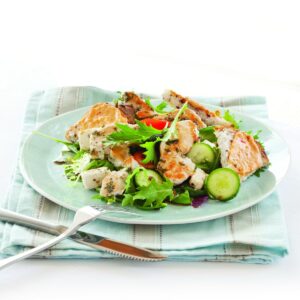
Niacin – or vitamin B3 – helps the body produce energy and is vital for the nervous system. It also keeps us functioning well psychologically and is great for our skin.
What happens if I don’t get enough vitamin B3?
In most developed countries, most people get plenty of vitamin B3. In fact, on average, we have just over twice as much as the recommended daily intake (RDI). It’s easy for us to meet and exceed the RDI because it’s found in a wide range of foods. It can also be made in the body from a protein building block called tryptophan (the amino acid also used to make mood-boosting serotonin). As the RDI is based on the amount we need to prevent a deficiency of that nutrient, there’s no need to worry if we get more of it through eating a healthy balanced diet.
New concerns
Nevertheless, there are fresh worries that pellagra – the disease caused by a deficiency of vitamin B3 – may be on the increase in Western countries, due to more people following fad diets or suffering from eating disorders. Early signs include loss of appetite, fatigue, stomach pain, vomiting and irritability. In the later stages, symptoms are often characterised by the three Ds: diarrhoea, dermatitis and dementia.
How much vitamin B3 do I need each day?
The Nutrient Reference Value (NRV) for vitamin B3, which you’ll see on food labels, is 16mg. But there are more detailed guidelines in the vitamin B3 needs at specific ages and stages in life such as in pregnancy and breastfeeding women.
Supplement safety
Niacin intakes from food don’t have any negative effects, but high doses from supplements can have a toxic effect, causing skin flushes and itching, nausea, gastric problems such as an upset stomach or diarrhoea and, in the long run, could lead to diabetes and liver damage. Look out for niacin on supplement labels in the form of nicotinamide or nicotinic acid: doses of below 500mg nicotinamide or 17mg nicotinic acid are unlikely to cause harm but remember, you’re probably getting more than enough niacin from food.
You may have read that nicotinic acid can help lower cholesterol. However, due to the side effects, it’s rarely prescribed. It certainly isn’t a substitute for cholesterol-lowering medication, so if you have high cholesterol, talk to your GP before taking any supplements containing niacin (especially in the form of nicotinic acid).
Everday foods for B3
| Food | Weight in mg |
|---|---|
| 1 (125g) grilled chicken breast | 27.5 |
| 140g grilled mackerel | 21.7 |
| 100g lamb's liver (raw weight) | 20.7 |
| 140g grilled salmon | 17.9 |
| 125g grilled rump steak | 17.3 |
| 125g can sardines in tomato sauce | 13.4 |
| 2 slices lean roast pork leg (80g) | 13.1 |
| 140g grilled haddock | 11.6 |
| 2 slices well-done lean roast beef (80g) | 11.1 |
| 100g lean minced beef (raw weight) | 9.4 |
| 200g cooked wholemeal pasta | 6 |
| 30g unsalted peanuts | 5.8 |
| 30g bran flakes | 5.4 |
| 150g cooked couscous | 5 |
| 150g cooked brown rice | 4.8 |
| 100g cottage cheese | 3.6 |
| 200g baked beans | 3.4 |
| 1 Weet-Bix/Weetabix/Wheat biscuit | 3.2 |
| 100g Quorn | 3 |
| 30g sunflower seeds | 2.7 |
| 1tbsp peanut butter | 2.6 |
| 1 slice wholemeal bread | 2.4 |
| 80g raw mushrooms | 2.4 |
| 30g reduced-fat cheddar | 2.3 |
| 1 egg | 2.1 |
| 80g frozen peas | 2 |
www.healthyfood.com











